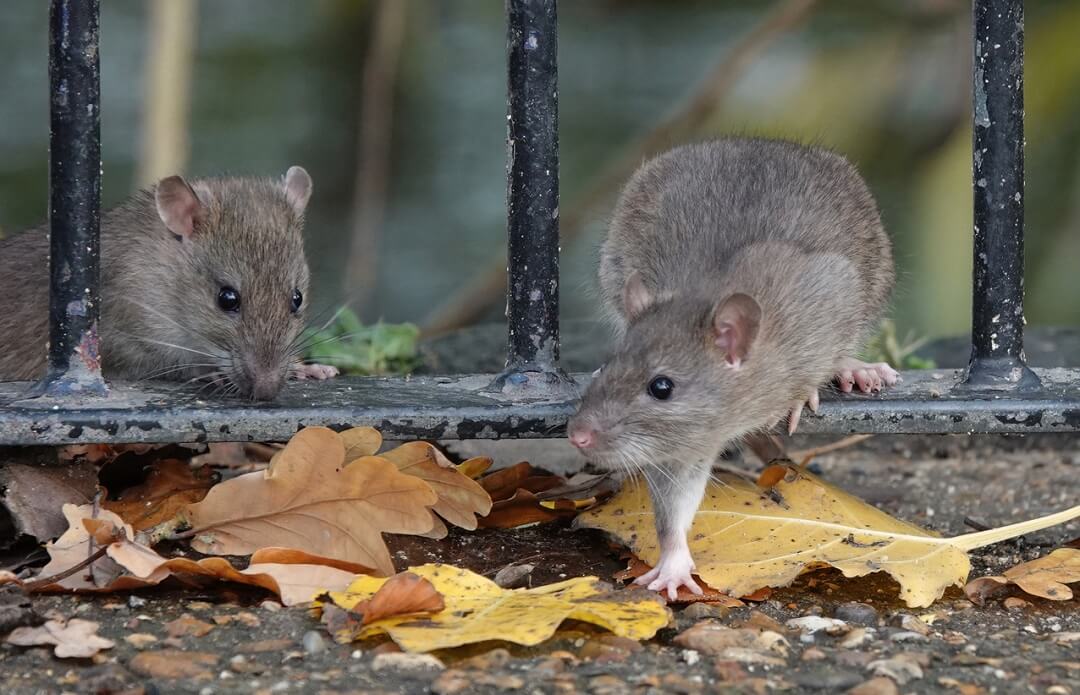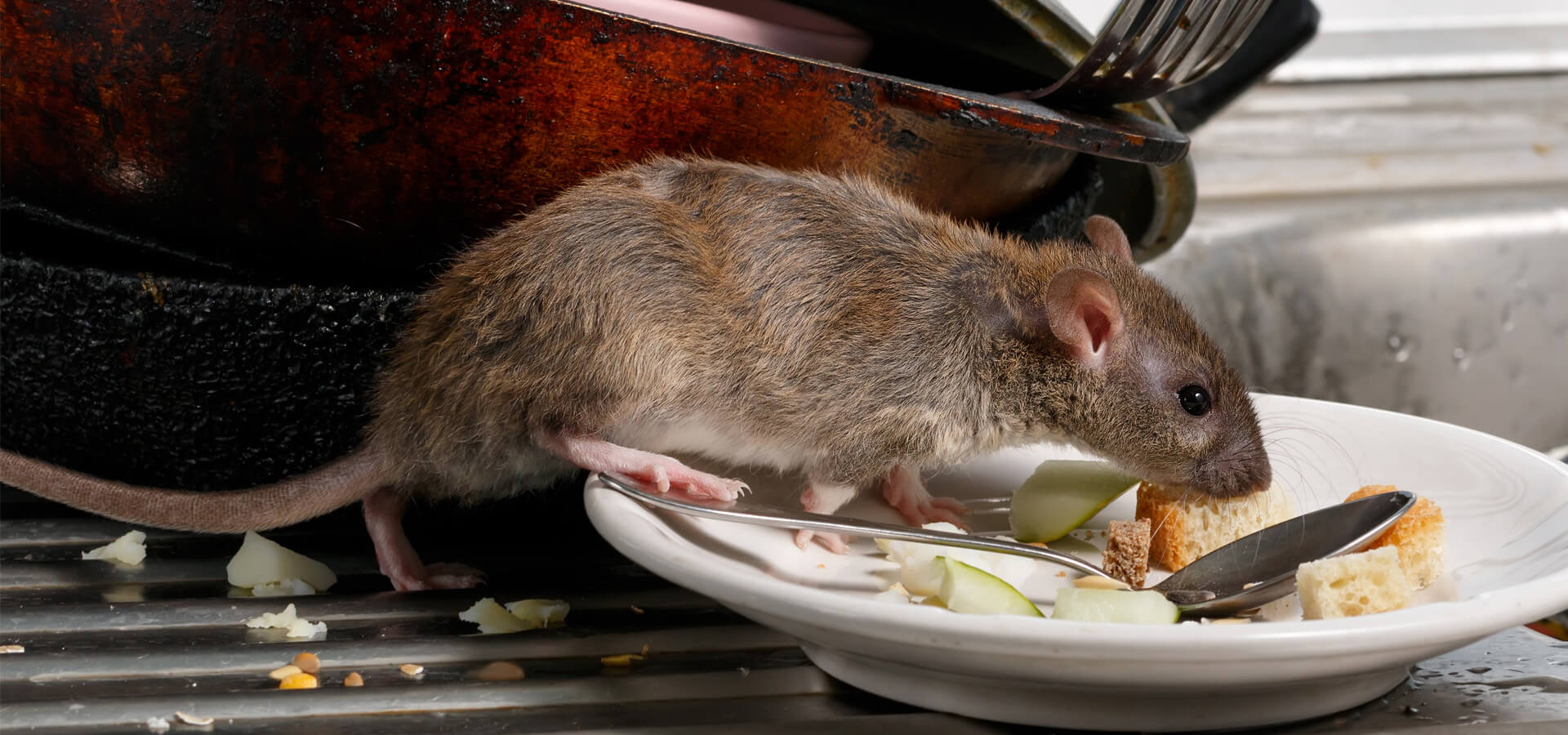The last thing a homeowner wants to see is a rat scurrying across the floor. These rodents can pose a serious risk to humans, carrying bacteria and diseases. But how do you get rid of rats when they move into your home?
While there are multiple effective solutions for eliminating rats in the home, such as traps or bait, keeping them out of your home long-term involves many additional steps which are just as important and include everything from points of entry to what your home offers rats in terms of food and shelter.
Here we take a closer look at getting rid of rats and making your home less appealing to these and other rodents.
Key takeaways
- To get rid of rats in your home, you need to conduct a thorough home inspection to identify potential entry points, seal all entry points, set rat traps, use effective repellents, eliminate potential food and water sources, and seek professional help if necessary.
- Common signs of a rat infestation include strong odors, unexplained sounds, presence of rat droppings, oily smears along walls, home damage, and gnaw marks.
- To prevent a rat infestation, you should stop feeding wildlife near your home, ensure all entry points are sealed, keep waste covered, eliminate food sources, and maintain your lawn and landscape.
- You can use scents like peppermint, citronella, vinegar, cayenne or black pepper, eucalyptus, clover, coffee, bleach, and mothballs to keep rats away, but sealing entry points and eliminating food sources are necessary to permanently get rid of rats.
- If you are unable to get rid of rats on your own, it may be time to call in professional rodent control services.
How to get rid of rats in the house fast
If you suspect rats in your home, there are some things you can do to identify the presence of rats, find out where they are coming from, and effectively remove them from your home. Here we take a look at the steps to take to get rid of rats.
1. Conduct a home inspection.
If you believe you may have rats, the first thing to do is to thoroughly inspect your home, both inside and out. When looking inside for the presence of rats, you are looking for droppings, chewed food boxes or packages, oily smudges along the walls, and an odd ammonia-like smell that you can’t pinpoint. Outside, you are looking for ways that a rat could enter your home. This can include cracks in the foundation, gaps around the garage door or other doors of entry, gaps around the foundation and around piping, and dryer vents.
2. Seal all entry points.
Once you identify potential points of entry to your home, you need to seal these entry points and eliminate the ability for rats to enter. You can seal these entry points with caulk, wire wool, or metal kick plates, depending on the entry point. Keep in mind that rats can enter through any opening large enough for your finger or thumb to get through.
3. Set rat traps.
If you are looking to eliminate rats in your California home by yourself, new laws in California limit your options to trapping as most rodenticides, or rat poison, are now limited to professional pest control specialists. When it comes to trapping, you have the option of traditional kill traps, such as snap traps, or live catch traps for relocation. Whichever option you choose, you want to position the traps in areas where you find evidence of rat activity, such as smudges on the walls. Bait your traps with things like apples or peanut butter.
4. Use effective repellents and deterrents.
If you suspect rats in the area, you can try and deter them from entering your home in the first place with the use of rat deterrents or natural repellents you may already have in your home. For example, peppermint oil, cayenne or black pepper, and cloves around the perimeter of your home can irritate the rats’ noses and airways and have them searching somewhere else for food and shelter.
5. Take advantage of natural predators.
Rats have many different natural predators, including the family cat. Even if Tom isn’t all too keen or very good at chasing and catching Jerry, cats can be a natural deterrent to rats. In addition, encouraging owls in your area, such as by adding an owl next box, can help encourage the presence of these birds of prey which also provides a natural deterrent.
6. Eliminate potential food and water sources.
If rats have invaded your pantry and chewed through the cereal boxes, changing how you store food may be necessary in order to eliminate a food source. For example, instead of storing cereal in the boxes they come in, and transfer them into a tightly sealed container that rats can’t access. In addition, do not leave pet food out for extended periods or you may find you are feeding unwanted pets.
While rats often get their water from the food they eat, finding a home with a food and water source can be beneficial. Leaky pipes are often another thing that can attract rats into your home, so repair is essential.
7. Seek professional help.
Whether you are tired of trying to manage a rat population on your own or simply want nothing to do with trapping rats and just want the rats gone, professional pest control services can not only help eliminate rats, but they can also help ensure that entry points are identified and sealed, as well as help eliminate rats in the yard, helping to reduce the risk of these pests making entry.
Click here to learn more about professional rat management in Ventura County.

How do you know you have a rat infestation?
If you suspect a rat in your home, there are some tell-tale signs that offer evidence of a rat infestation. If you see any of these signs, chances are you have a rat or rodent problem in your home.
Strong odors
When rats invade a home, they leave behind a very powerful ammonia smell that can quickly fill your home. Despite regular cleaning and disinfecting, this smell may continue to linger as it is likely inside the walls.
Unexplained sounds
Because rats tend to create a nest within the walls of your home, you may hear strange squeaking or scratching from within your walls. You may also hear rustling as the rat travels through the walls in search of food.
Presence of rat droppings
Rats leave behind droppings just about everywhere they travel. When the rat ventures out into the open of your home, such as near sources of food or along baseboards, they are likely to leave behind droppings. When compared to mouse poop which is similar in size to a grain of rice with pointy ends, rat droppings are larger, dark in color, and have rounded ends.
Oily smears along walls
Rats have oily fur and as they navigate around baseboards and other surfaces throughout your home, they leave behind these oily or greasy smears or streaks along the walls. Once they find a food source, they are likely to follow the same path, spreading this oil over and over again on the walls, creating a distinct appearance.
Home damage
While rats spread bacteria and disease, posing a threat to you and your family, they are also very destructive in nature and can cause significant damage to your home. You may find boxes or books with chew marks as well as chew marks on your furniture. If you notice your lights are flickering or an electrical item isn’t working, rats may be chewing through the electrical wiring in your home, increasing the risk of fire.
Gnaw marks
Rats chew just about anything to get what they want. You may notice gnaw marks on everything from food packaging to furniture and floorboards.
Read here to learn more about the Signs of Rat Infestation You Should Watch Out For.

How to prevent a rat infestation
If your home is rat-free and you want to keep it that way, there are some things you can do to help ensure your home does not throw out the welcome mat to rats and other rodents.
Stop feeding wildlife near your home.
Feeding other wildlife, such as a bird feeder in the yard, will bring in beautiful birds, but also attract rats and other rodents. If you want to feed the birds, position feeders away from your home and only feed small amounts at a time so food does not remain in the feeder over time.
Ensure all entry points are sealed.
As we mentioned earlier, ensuring that potential entry points to your home are sealed is essential to keeping rats out of your home. When they are unable to find an easy access point, they are likely to move on and find an easier source of food and shelter.
Keep waste covered.
Trash cans around your home, whether inside or outside, can attract rats if left open. Ensure that all trash cans have lids that close securely, keeping smells to a minimum and preventing rats from gaining access. Empty trash often and if garbage bags leak, clean out garbage cans as necessary.
Eliminate food sources.
Rats enter your home looking for a source of food, so it is important to eliminate potential food sources. Because rats can chew through most food packaging, you may want to transfer foods into more secure storage containers. For example, transferring chips or cereal out of bags and boxes and into secure food containers.
Outside, birdseed provides rats with an easily accessible food source. Only place a small amount of seed into bird feeders and keep seed storage secure.
Maintain your lawn and landscape.
In addition to looking for food sources, rats are also on the lookout for safe and secure shelter. In a yard full of debris or woodpiles, rats can easily find a safe place to call home. Keeping your yard mowed and your landscape clean and maintained helps to limit potential nesting locations. If you have fruit trees, keeping fruit from the ground where it can attract rats is important. If tree branches hang over the roof, it is important to keep them trimmed so they do not create a path for rats to find roof access.

Frequently asked questions
When it comes to rat infestations in the home, many homeowners have many questions. Here we answer some common questions we hear.
What scent will keep rats away?
Rats are highly sensitive to smells, meaning that many things can be effective rat deterrents. Some common scents that rats dislike include peppermint, citronella, vinegar, cayenne or black pepper, eucalyptus, clover, coffee, bleach, and mothballs.
Can you get rid of rats permanently?
Getting rid of rats and keeping them from returning to your home permanently is possible and requires the complete sealing of entry points, eliminating food sources, and addressing potential concerns in the yard, such as trash and bird feeders.
What home remedy can I use to get rid of rats?
There are many home remedies, such as peppermint oil, that can help keep rats from your home. However, if you have a rat infestation, many of these home remedies may help, but sealing entry points and eliminating the rats with traps or professional pest management is usually necessary to eliminate a rat infestation.
Keeping your home or business rat-free
If you think you have a rat in your home, it is important to address the problem before that rat multiplies and you have an infestation. To start, you need to identify potential points of entry and make sure they are sealed in order to prevent rats from gaining access. Setting traps or calling in professionals can help eliminate rats that are already in the home. Once you are rat-free, there are deterrents and things you can do to help ensure the rats do not return.
When its time to call the professionals
If you feel like you are fighting a never-ending battle and the rats are winning, it may be time to call in professional rodent control and the team at Insight Pest Management. Our experts understand rat behavior and they can quickly identify rats in the home and how they are getting in. Our team will work with you to eliminate the rats and then help seal and control points of entry while creating a management plan that ensures your home stays rat-free.
Contact our rodent control experts today to get a free quote and learn how our team can help eliminate your rat problem.


